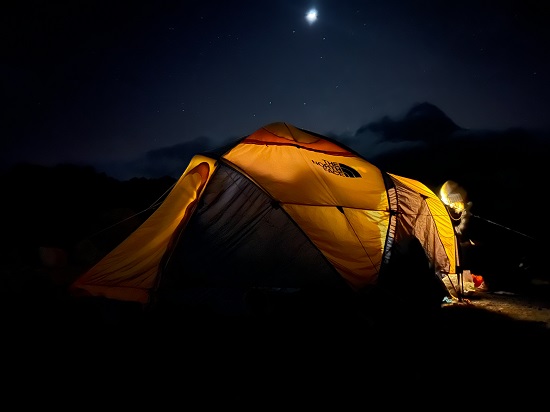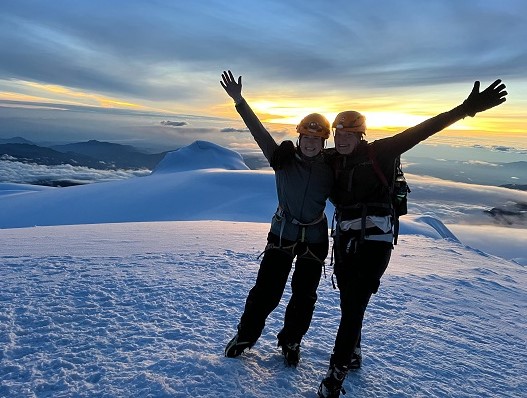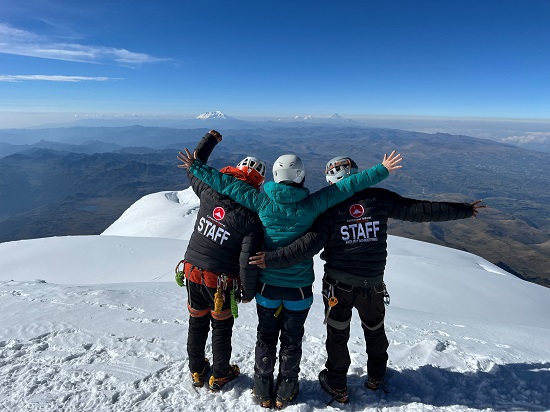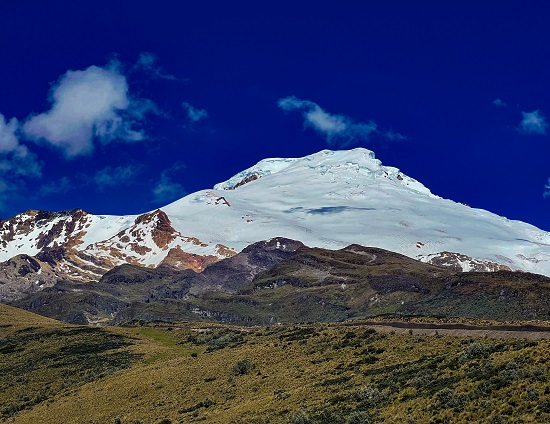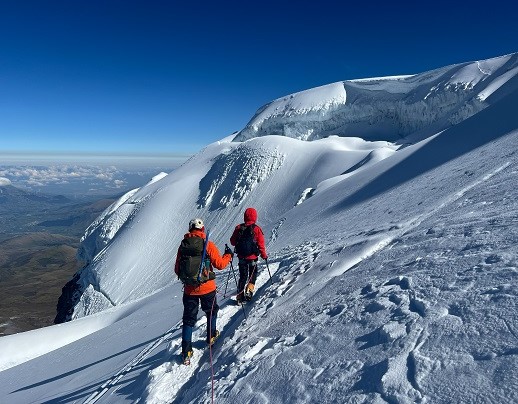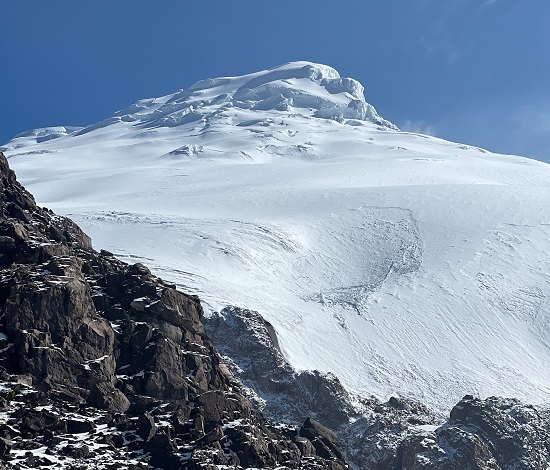Climbing Cayambe Summit
OVERVIEW
ITINERARY
# Day |
Place |
Elevation |
Day 1: |
Cayambe Refuge |
4700m./15,419ft |
Day 2: |
Cayambe Summit |
5790 m./18,996ft. |
Climbing Cayambe Day By Day
Day 1: Cayambe Refuge 4700m
Cayambe is a massive glaciated extinct volcano. It islocated about 70 km Northeast of Quito and is the highest point on the surface of the earth through which the Equator directly passes. Cayambe is the third highest mountain in Ecuador. It is characterized by good climbing opportunities and impressive glaciers. With easy access from the comfortable hut Ruales Oleas Cayambe Refuge. We will arrive at the shelter after about 3.5 hours of driving and rest for a couple of hours at the Refuge, until dinner time
Meals:(Lunch/Dinner)
Accommodation:Refuge Ruales-Oleas-Bergé
Day 2: climbing Cayambe Summit 5790m – Quito
We will wake up at midnight, eat a light breakfast, put our gear on and start our climb around 01:00 in the morning; the ascent takes about 6 to 7 hours. The route to the summit follows a safe glacier terrain to the summit. A gaping bergschrund sometimes presents a challenge in route finding and an exciting extra obstacle. Once at the summit (18,996ft/5790 m) we will take our time for pictures of the surroundings and then we willhead back to the refuge in 2 to 3 hours. At the Refuge we will rest for a while, then pack our belongings and drive to "Quito"
Meals:Breakfast
Accommodation:(-/-)
SERVICES
Services included in the prices:
- Ecuadoriancertifiedand experienced local Mountain Guide (ASEGUIM/UIAGM) ratio 2climbers-1 guide)
- Registration in the System SIB (System Information of Biodiversity)
- Technical mountain equipment (Mountaineering Boots, crampons, ice axe, harness, helmet)
- Land transportation and transfers toCayambe
- Refuge Ruales-Oleas-Bergé1 night ✓All meals during the hikes and climbs (shown above)
Not included:
- Personal mountain gear (warm cloths, sleeping bags, sunglasses, head lamp, etc.)
- International flight tickets
- Hotel in Quito
- Tips
- Insurance of any kind Travel accident and health insurance
- Luggage insurance and trip cancellation
- Other non-specified expenses
_________________________________________________________
Recommendations:
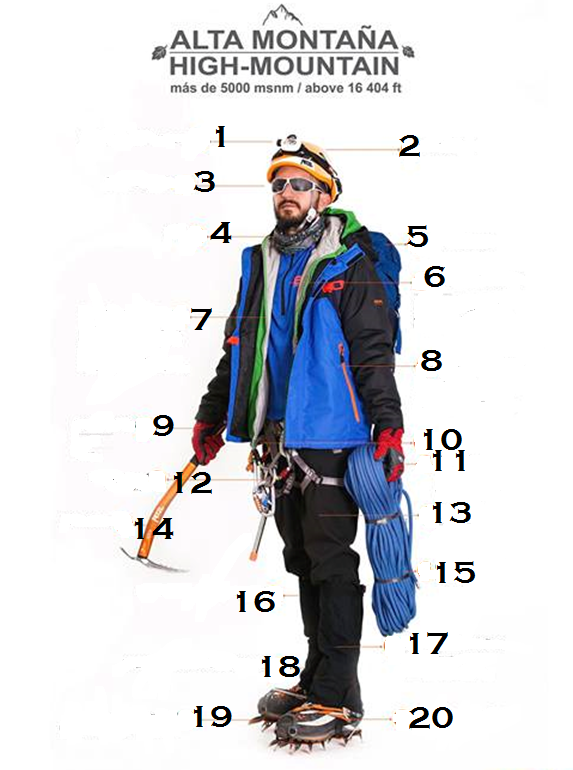 What to Bring?
What to Bring?
- 1.- Head torch
- 2.- Helmet (includes)
- 3.- Sun Glasses
- 4.- Buff/ Warm cap
- 5.- Backpack
- 6.- First layer
- 7.- Second layer
- 8.-Third layer (Waterproof Windbreaks, Waterproof pants)
- 9.- Mittens/Gloves
- 10.- Harness (Includes)
- 11.- Inside gloves
- 12.- Carabiners (Includes)
- 13.- Thermal pants
- 14.- Ice ax (includes)
- 15.- Dynamic Rope (includes)
- 16.- Thermal Lycra
- 17.- Gaiters (includes)
- 18.- Socks Mountain
- 19.- Crampons (Includes)
- 20.- Mountaineering boots (Includes)
- 21.- Sleeping Bag
- 22.- Battery Groups AAA
- 23.- Sunscreen
- 24.- Trekking Poles
- 25.- Thermo / Canteen fro Water
- 26.- Energy bars
PRICES & PAYMENT
 Group of 2.........000 USD per person
Group of 2.........000 USD per person Group of 3.........000 USD per person
Group of 3.........000 USD per person Group of 4.........000 USD per person
Group of 4.........000 USD per person Group of 5........000 USD per person
Group of 5........000 USD per person
 1 Person........... 000 USD
1 Person........... 000 USD
Book now
Price: PLEASE CLICK NOW
PAYMENT & CANCELLATION
Payment
In order to confirm the reservation of any tour service provided by Cotopaxi Travel Company Cia. Ltda. we require a pre-payment of 30% of the tour price. The remainder is to be carried out before climbing tour or travel starts. We will not send confirmations, vouchers or flight tickets until the full balance has been received, and we reserve the right to cancel your trip if full payment is not received prior to the start date.
PRICES, SURCHARGES AND CREDIT CARD CHARGES
All prices we advertise are accurate at the date published/advised, but we reserve the right to change any of those prices prior to booking. Before you make a booking we will give you the up-to-date price of your chosen programme including the cost of any peak-season supplements, upgrades or additional facilities which you have requested.
For all payments made by credit card, a 6% service fee will be added to the cost. The additional costs for every transfer made out to Cotopaxi Travel Company Cia. Ltda. Ecuadorian Taxes and bank transfer fees, will have to be paid by you, the client. We are obligated tu charge 12% IVA for every payment realized by Ecuadorian citizens.
Cancellation by You
Notice of cancellation by you must be given in writing. Should you cancel, the following scale of charges will apply:
- - 30 days or more before the Departure Date = loss of deposit.
- - 29 to 15 days from the start of the trip = 50% of total trip cost
- - Less than 14 days before the Departure Date = loss of 100% of total trip cost,
- unless agreed otherwise with cotopaxi travel due to unforeseen circumstances.
Cancellation by Cotopaxi Travel Company
A trip may be cancelled as a result of unforeseen events and beyond Cotopaxi Travel´s control including but not limited to war, riot, industrial dispute, terrorist activity, natural Cotopaxi Travel• Calle Guayaquil 6-74 y Sanchez de Orellana- Latacunga - Cotopaxi - Ecuador Terms & Conditions 2 or nuclear disaster, fire, epidemics or health risks, closed or congested airports, ports or stations, changes imposed by re-scheduling or cancellation of transport, adverse weather conditions.
DATE
15-23 October 2023
21-29 October 2023
5-13 November 2023
12-20 November 2023
19-27 November 2023
25 Nov. -3 December. 2023
3-11 December 2023
10-18 December 2023
16-24 December 2023
25 Dec.-2 January 2024
6-14 January 2024
LOCATION
Country / Location: Ecuador
IMPORTANT DETAILS
In Ecuador you can Climb all year, but these are the seasons
High Season: June to August / December to January
Low season: February to May / September to November
Ecuador is a fantastic destination that offers plenty of options for travel lovers. In addition to the Andes, Galápagos and Amazon Jungle are also part of this amazing land.
Difficulty: (Beginner) No prior climbing experience is required. Climbers should be in good physical condition and it is highly recommended that they have some backpacking experience.
Places:  *Available
*Available
Trip-code: Number ►Cotoclimb-2D
Duration: 2 days
Participants: Minimum: 2 Maximum: 12
Mountain Guide / TripAdvisor: Fernando Iza
Other dates / additional info: Contact us!
Legend Booking-information
EZZ - Single room supplement
 On this trip, places are still available.
On this trip, places are still available.
 On this trip, only a few places left.
On this trip, only a few places left.
 This trip is sold out / closed.
This trip is sold out / closed.
FAQ'S TIPS AND ADVICES
FAQ's
-
IS NECESSARY PREVIOUS GLACIER EXPERIENCE?
- Having previous glacier experience is not required. We do recommend that you have joined one of our best acclimatization and ascent programs containing instructions and skills that we teach you as previous mountaineering training helps you enjoy the overall experience. Is also important that you try out your mountaineering gear prior to joining this adventure if you don’t have we have for you in our rental equipment shop.
- WHEN IS THE BEST TIME TO CLIMB COTOPAXI?
- A). In Ecuador you can Climb all year, but these are the seasons - High Season: June to August / December to January - Low season: February to May / September to November
- B). Likewise, weather forecasts are very unpredictable. Therefore, we recommend being prepared for all types of weather.
- DO I REALLY NEED RESCUE INSURANCE?
- We strongly urge you to purchase travel and accident insurance. We recommend Global Rescue for both types of insurance.
- IS CAYAMBE A DANGEROUS MOUNTAIN?
- A). Cayambe is a relatively safe climb on the routes we climb. The biggest challenges are the high altitude and people not coming physically prepared. Some groups try to ascend too quickly and do not take the time to acclimatize. We do not have this issue because our itinerary has been carefully planned over years of experience working in low oxygen environments.
- ACCLIMATIZATION IS IMPORTANT AND HOW DO I PREPARE FOR HIGH ALTITUDE?
- A). Acclimatization is the most important and should be taken seriously. Even if you are fit and practice any physical activity, it is important to follow the process for a successful climb.
- B). Firstly, there is some very specific training you should be doing. Learn more. Let’s be clear, always pick the itinerary with more acclimatization built in. After that, you need to focus on mapping out a training plan that focuses on strength and endurance. We will pace the trip at lower heart rates so we can perform for longer periods of time. You still need to be comfortable hiking for 6+ hours. We know that building up the weight you carry in your backpack for hours at sea level builds endurance, strength and cardio which stress tests your body for high altitude. We can help you learn more about how to prepare for your high-altitude adventure.
- WHAT KIND OF GEAR, CLOTHING AND EQUIPMENT DO I NEED TO BRING?
- A). We will provide you with a full detailed itemized kit list so that you.
- SAFE TO BRING AND LEAVE OUR BAGS IN THE BASE CAMP?
- A). Yes, you can leave a bag of items not needed in our base camp. You can also leave valuable items in the safe.
- WHAT ROUTE DO WE CLIMB ON?
- A). Depending on the glacial conditions we will follow the safest route to the top. We also leave from the refuge at 4864 m./15,958 ft for all our summit attempts
- . DO YOU HAVE TRAINING ADVICE?
- A). If you sign up to one of our trips, we can give ongoing advice. We also have training courses in Cotopaxi that you can sign up to.
- CAN I PAY WITH CREDIT CARD?
- A). Yes, you can do it
TIPS
- Develop a personalized training plan. Mountaineering requires multiple types of training, each focusing on a different need:
- Cardio workouts to improve the overall fitness level of your heart and lungs.
- Interval sessions to boost your ability to process more oxygen with each breath.
- Strength and endurance exercises so you can haul a heavy load and sustain physical output for many hours.
- Balance and flexibility training because you need both for mountaineering.
- Hiking days to extend your training into real-world situations.


